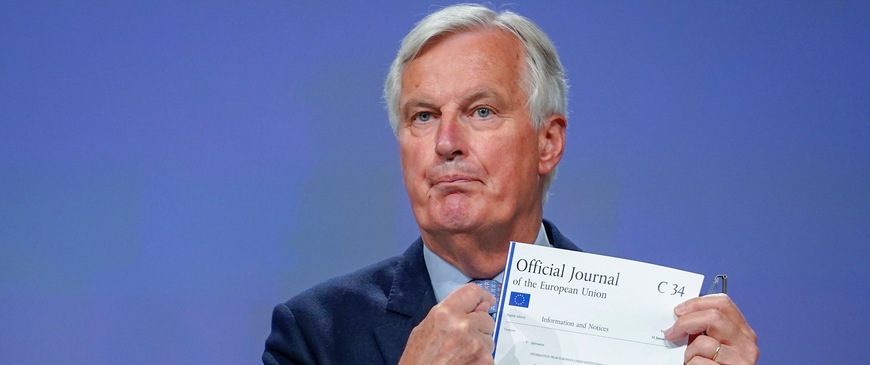
EU-UK negotiations: No need to panic (yet)
A deal between the EU and UK remains possible. But neither side is likely to compromise on its current negotiating position until later in the year, when the cost of failure will become significantly more tangible.
The fourth round of negotiations between the EU and UK over the nature of their future relationship concluded last week to little fanfare. The outstanding issues – disagreement over access to fishing waters, the so-called ‘level playing field’ provisions, and the structure of the agreement – are well known and remain unresolved, while other lesser-known disputes bubble beneath the surface. Yet, even without a global pandemic consuming political attention, the chances of an agreement being reached before the summer were always slim to non-existent.
Michel Barnier and David Frost, the EU and UK chief negotiators, are both constrained by their respective negotiating mandates and unable to make the compromises necessary to get a deal over the line. Only when Boris Johnson and EU leaders re-engage with the negotiations later in the year will we know if there is a deal to be done.
Only when Boris Johnson and EU leaders re-engage with the negotiations later in the year will we know if there is a deal to be done.
As I have written previously, despite the current hostilities, it is possible to map a route through the current impasse towards an agreement that might be acceptable to both sides. But concluding a deal will require both parties to step away from their opening negotiation positions and accept alternative means of achieving their objectives. One example: the EU fears that the UK will pour money into British companies to give them a new advantage over their EU-based competitors. To avoid this, the EU has so far insisted that EU state aid law must continue to apply in the UK indefinitely, but it should instead focus on the effectiveness of the UK’s state aid regime while retaining the ability to re-impose tariffs in the event of a breach by the British.
In return, the UK needs to accept the broader principle of non-regression, and commit to maintaining existing levels of protection. It should also agree that its level playing field commitments will be subject to dispute settlement, with the possibility of concessions being withdrawn in the event of a breach (as it will have to concede in a trade agreement with the US). This should be less contentious than it first sounds: all the UK is being asked to do is accept that EU tariffs could be re-imposed in the future if it rolls back protections, rather than having them imposed now because the two parties fail to reach a deal.
Beyond the well-known headline issues, the recent publication of the UK’s draft legal text exposes some other areas of disagreement. In areas such as the mutual recognition of professional qualifications and rules of origin, the UK is asking for more comprehensive provisions than the EU normally offers in its trade agreements.
In the case of mutual recognition of professional qualifications – the process by which the engineering qualification of a British worker, for example, continues to be recognised across the EU-27 – the UK has rightfully identified that the provisions in existing EU free trade agreements (FTA) do not work well, and is seeking to improve them. In practice, the existing EU approach to third-country FTA partners is to encourage the relevant professional bodies to agree to recognise each other’s qualifications. But this has had little success. Instead, the UK is proposing that British qualifications should, upon application, continue to be recognised across the EU (and vice-versa), subject to an aptitude test in specific circumstances. While it is unfair to say that the UK is asking for single market treatment (the UK is not asking for temporary recognition of qualifications for the purpose of cross-border trade), its proposal goes far beyond the EU’s normal FTA offer.
Rules of origin are the criteria which determine whether an exported product is ‘local’ enough to qualify for the preferential treatment of a trade agreement. Here, the UK is proposing that inputs imported from third countries that both the EU and UK have free trade agreements with should be treated as being local to either party for the purpose of meeting the rules of origin requirements of the EU-UK trade deal – so called ‘cross-cumulation’. Such provisions are of particular interest to the UK: without them some UK exports would struggle to qualify for zero tariffs under a free trade agreement with the EU because they contain too much foreign content. While the EU does include provisions allowing for cumulation in some of its agreements, allowing for inputs from all of its FTA partners to be treated as local UK content would be an unprecedented increase in scope.
There are also some oddities in the UK’s draft legal text, such as the exclusion of government procurement from the discussion, despite it being commonly addressed in FTAs and something the UK is keen to include in other trade negotiations with the US and Japan. George Peretz, a QC specialising in EU state aid, has speculated that this may be because the UK companies are better-able to “free ride” on existing, general, EU procurement rules preventing discrimination than they can with the US, in particular.
More positively, despite being hostile to the inclusion of ambitious labour mobility provisions in EU FTAs while it was a member, the UK has increased its ambition and is, for example, suggesting that intra-corporate transferees moving between the UK and EU can do so for up to five years. The usual length of time the EU offers is up to three years.
If there is agreement on the major areas of contention there is little reason to think that minor differences on the issues sketched out above would scupper the negotiations. While the UK’s demands are ambitious, with the major differences resolved, levels of mutual trust and goodwill would be much better than they are now.
But one factor that cannot be easily managed through the negotiations is time pressure. Even if an EU-UK deal is reached before the December 31st deadline, there is not enough time for businesses to prepare for a January 1st 2021 rupture. A free trade agreement does not negate the fact that the UK will be moving from a highly integrated relationship with the EU to one in which trading between the two becomes significantly more difficult. Furthermore, the protocol governing trade between Great Britain and Northern Ireland is unlikely to be fully operational by the end of the year.
A free trade agreement does not negate the fact that the UK will be moving from a highly integrated relationship with the EU to one in which trading between the two becomes significantly more difficult.
Asking business and government to prepare for the end of the transition period, while also dealing with the fallout from COVID-19, is a risky endeavour. The sensible approach would be for the UK and EU to agree to extend the transition period before the July 1st deadline, so as to avoid distraction from the more pressing issue of dealing with the pandemic. While the EU is open to an extension, the UK it is currently opposed. We cannot rule out that Boris Johnson will change his mind in the coming weeks, but it seems improbable.
There may be other ways to buy more time for businesses to adapt to a new EU-UK free trade agreement, but they are all more complicated than extending the transition. Regardless of the mechanism, it is in both the EU and the UK’s interest to avoid the disruption and political cost inherent in introducing significant border friction overnight. The future free trade agreement could, for example, include provisions granting businesses more time to adjust to the new trading relationship, such as continued UK membership of the EU’s customs union and single market for goods for a fixed period of time. Unfortunately for businesses, neither the EU nor UK will open discussions on phasing in the future relationship until a deal between the two is all but certain.
While the UK government currently appears ambivalent about reaching a deal with the EU, this will not last. As the end of the transition period approaches later in the year, and talk returns to business preparedness, stockpiling and fragile supply chains, the reality of the situation will begin to take hold. Arguments that COVID-19 will provide political cover for the economic fallout of Brexit are unconvincing – exiting the transition will exacerbate the negative economic impact of COVID-19 in some sectors, and create new problems in previously unaffected ones.
As the end of the transition period approaches later in the year, and talk returns to business preparedness, stockpiling and fragile supply chains, the reality of the situation will begin to take hold.
Boris Johnson and Ursula von der Leyen, the President of the European Commission, are set to meet on Monday. The best case scenario would see the pair agree in general terms on a landing zone for the future relationship, giving the negotiations fresh impetus. The worst case would see Johnson collapse the talks in an attempt to distract from domestic criticism over his government’s handling of COVID-19. But in reality, neither of these scenarios would determine the eventual outcome of the negotiation. Even if the negotiations do collapse next week, there is still a chance that Johnson later performs an about-turn and strikes a deal with the EU in the autumn. Equally, agreement to continue talking over the summer is no guarantee that the two sides will resolve their differences.
The route towards an agreeable compromise exists. But the EU and UK are unlikely to commit to finding it until later in the year, when the economic, and political, consequences of the alternative become significantly more tangible.
Sam Lowe is a senior research fellow at the Centre for European Reform.

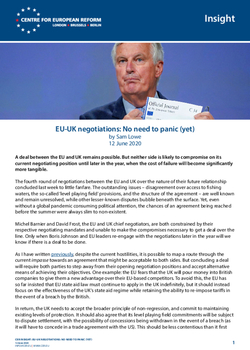
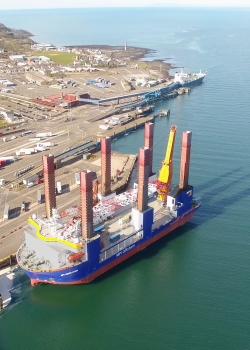
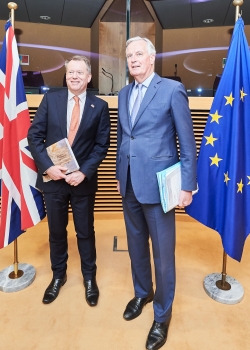
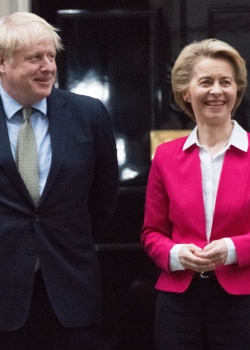
Add new comment